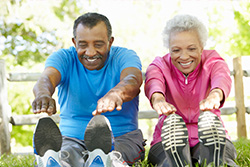For older adults, exercise can be a life extender

What comes to mind when you think of exercise? Discomfort? Sweat? Maybe you think of athletic, toned bodies lifting weights or spending serious time on a treadmill.
What should come to mind when you think of exercise is “extension”— as exercise helps extend the wellbeing of both body and mind. The best part about exercise is that it can easily be tailored to benefit people of all ages, shapes, sizes or physical limitations.
Exercise is important at any age. It helps to keep our cardiovascular system healthy, improves our blood pressure, lowers risk of developing diabetes and certain cancers and also helps to improve our overall stress level and immune system.
Even for those who haven’t been physically active for years, it’s never too late to start. Many older adults have medical conditions to consider, such as arthritis, high blood pressure, diabetes or heart disease. That’s why the first step is to get advice from the experts: your doctor to make sure an exercise program will be safe and beneficial for you; and perhaps a certified fitness professional who can customize an exercise plan that is right for you.
So important is physical activity that it negates the commonly held notion that older adults should “take it easy” and save their strength. There are exceptions, of course, but most of the time it’s best for seniors to get out there and move around. Strength training is great because it helps to keep bones, ligaments, and tendons nice and strong. Cardio conditioning is also important because it improves energy levels and helps to improve confidence levels. Watching your diet and focusing on eating healthy may help with some weight loss but exercise will aid in losing weight faster. The fact remains that eating healthy is important but you still need to burn calories and maintain better body tone through exercising.
How much physical activity do older adults need? According to the American College of Sports Medicine, the exercise standards for the adult population over 60 is to get at least 150 minutes of moderate intensity exercise per week. This can be met through 30-60 moderate intensity exercises (5 days a week) or 20-60 minutes of vigorous intensity exercise 3 days per week. Gradual progression of exercise time, frequency and intensity is recommended for best adherence and to avoid risk of injury.
Exercise: good for the mind and body
- Eases stress and anxiety
- Lifts mood and relieves depression
- Helps with brain function
- Improves self-esteem and sleep
- Boosts energy
- Improves changes for a longer, healthier life
- Improves heart, lung and muscle fitness
- Reduces risk of falling
- Helps prevent osteoporosis
- Helps to prevent the development of heart disease, stroke and certain cancers
In order to get the maximum benefits, it’s recommended you have to treat exercise like it is an appointment with your doctor. Physical activity needs to be done on a regular basis or else it will not work for you. Setting goals can help to be a motivator for exercising consistently. And then there’s the camaraderie factor that often builds when people exercise in groups or at clubs. It helps them stay committed and active, which is what it’s all about.
For articles on fitness, visit our health library. To find a primary care doctor or weight management specialist, please call 877-697-9355.


